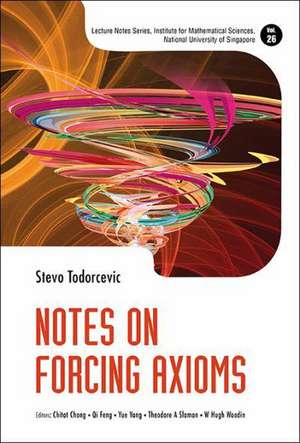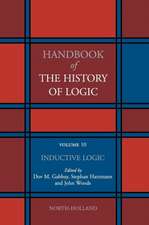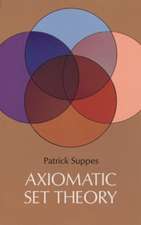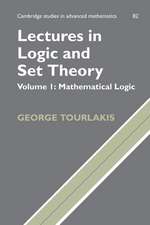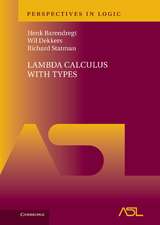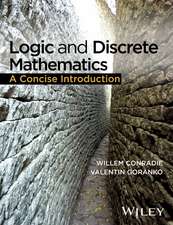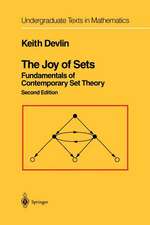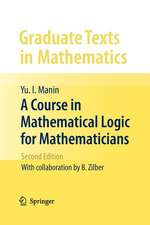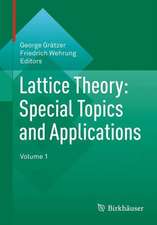Notes on Forcing Axioms: Population, Agriculture: Lecture Notes Series, Institute for Mathematical Sciences, National University of Singapore, cartea 26
Autor Stevo Todorcevic Editat de CHITAT CHONG, Qi Fengen Limba Engleză Hardback – 25 dec 2013
Din seria Lecture Notes Series, Institute for Mathematical Sciences, National University of Singapore
- 15%
 Preț: 634.37 lei
Preț: 634.37 lei - 15%
 Preț: 576.11 lei
Preț: 576.11 lei - 18%
 Preț: 946.89 lei
Preț: 946.89 lei - 18%
 Preț: 836.16 lei
Preț: 836.16 lei - 15%
 Preț: 517.89 lei
Preț: 517.89 lei - 18%
 Preț: 724.93 lei
Preț: 724.93 lei - 18%
 Preț: 721.86 lei
Preț: 721.86 lei - 15%
 Preț: 540.95 lei
Preț: 540.95 lei - 15%
 Preț: 540.15 lei
Preț: 540.15 lei - 18%
 Preț: 846.38 lei
Preț: 846.38 lei - 15%
 Preț: 529.53 lei
Preț: 529.53 lei - 18%
 Preț: 759.99 lei
Preț: 759.99 lei -
 Preț: 410.62 lei
Preț: 410.62 lei - 15%
 Preț: 599.85 lei
Preț: 599.85 lei - 18%
 Preț: 741.34 lei
Preț: 741.34 lei - 15%
 Preț: 645.84 lei
Preț: 645.84 lei -
 Preț: 478.00 lei
Preț: 478.00 lei -
 Preț: 203.26 lei
Preț: 203.26 lei -
 Preț: 333.81 lei
Preț: 333.81 lei - 15%
 Preț: 538.59 lei
Preț: 538.59 lei - 15%
 Preț: 621.78 lei
Preț: 621.78 lei - 15%
 Preț: 621.64 lei
Preț: 621.64 lei -
 Preț: 360.23 lei
Preț: 360.23 lei - 19%
 Preț: 481.94 lei
Preț: 481.94 lei - 23%
 Preț: 599.67 lei
Preț: 599.67 lei - 23%
 Preț: 881.48 lei
Preț: 881.48 lei - 23%
 Preț: 600.04 lei
Preț: 600.04 lei - 23%
 Preț: 711.04 lei
Preț: 711.04 lei - 23%
 Preț: 755.58 lei
Preț: 755.58 lei - 23%
 Preț: 656.08 lei
Preț: 656.08 lei -
 Preț: 397.03 lei
Preț: 397.03 lei - 23%
 Preț: 754.98 lei
Preț: 754.98 lei - 23%
 Preț: 937.39 lei
Preț: 937.39 lei
Preț: 448.28 lei
Preț vechi: 527.38 lei
-15% Nou
Puncte Express: 672
Preț estimativ în valută:
85.81€ • 93.24$ • 72.12£
85.81€ • 93.24$ • 72.12£
Carte tipărită la comandă
Livrare economică 21 aprilie-05 mai
Preluare comenzi: 021 569.72.76
Specificații
ISBN-13: 9789814571579
ISBN-10: 9814571571
Pagini: 236
Ilustrații: black & white illustrations
Dimensiuni: 160 x 231 x 23 mm
Greutate: 0.57 kg
Editura: WORLD SCIENTIFIC
Seria Lecture Notes Series, Institute for Mathematical Sciences, National University of Singapore
ISBN-10: 9814571571
Pagini: 236
Ilustrații: black & white illustrations
Dimensiuni: 160 x 231 x 23 mm
Greutate: 0.57 kg
Editura: WORLD SCIENTIFIC
Seria Lecture Notes Series, Institute for Mathematical Sciences, National University of Singapore
Cuprins
The Baire Category Theorem and the Baire Category Numbers; Coding into the Reals; Descriptive Set-Theoretic Consequences; Measure-Theoretic Consequences; Variations on the Souslin Hypothesis; The S- and L-Space Problems; The Side-Condition Method; Ideal Dichotomies; Coherent and Lipschitz Trees; Applications to the S-Space Problem and the Von Neumann Problem; Biorthogonal Systems; Structure of Compact Spaces; Ramsey Theory on Ordinals; Five Cofinal Types; Five Linear Orderings; mm and Cardinal Arithmetic; Reflection Principles; Appendices: Basic Notions; Preserving Stationary Sets; Historical and Other Comments.
